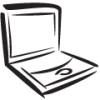Gateway M520 User Guide Gateway M520 Notebook - Page 148
Regulatory compliance, statements, Wireless Guidance
 |
View all Gateway M520 manuals
Add to My Manuals
Save this manual to your list of manuals |
Page 148 highlights
Regulatory compliance statements Wireless Guidance Low power, Radio transmitting type devices (radio frequency (RF) wireless communication devices), may be present (embedded) in your notebook system. These devices may operate in the 2.4 GHz (i.e. 802.11B/G LAN & Bluetooth), 5.2 GHz (i.e. 802.11A LAN), and traditional cellular or PCS cellular bands (i.e. Cellular data modem). The following section is a general overview of considerations while operating a wireless device. Additional limitations, cautions, and concerns for specific countries are listed in the specific country sections (or country group sections). The wireless devices in your system are only qualified for use in the countries identified by the Radio Approval Marks on the system rating label. If the country you will be using the wireless device in, is not listed, please contact your local Radio Approval agency for requirements. Wireless devices are closely regulated and use may not be allowed. The power output of the wireless device or devices that may be embedded in your notebook is well below the RF exposure limits as known at this time. Because the wireless devices (which may be embedded into your notebook) emit less energy than is allowed in radio frequency safety standards and recommendations, Gateway believes these devices are safe for use. Regardless of the power levels, care should be taken to minimize human contact during normal operation. Measurements have been performed to show that the RF exposure is below what is considered safe limits; however care should be taken to make sure the user or bystanders keep the transmitter away from their body when the wireless device is transmitting. The transmitting antenna installed in the top third of the lid should be used in a manner to maintain 20 cm (8 inches) from user's or bystander's bodies. The wireless devices installed in this system are intended to be used indoors. In some areas, use of these devices outdoors is prohibited. Some circumstances require restrictions on wireless devices. Examples of common restrictions are listed below: Warning Radio frequency wireless communication can interfere with equipment on commercial aircraft. Current aviation regulations require wireless devices to be turned off while traveling in an airplane. 802.11B (also known as wireless Ethernet or Wifi) and Bluetooth communication devices are examples of devices that provide wireless communication. 142 www.gateway.com















